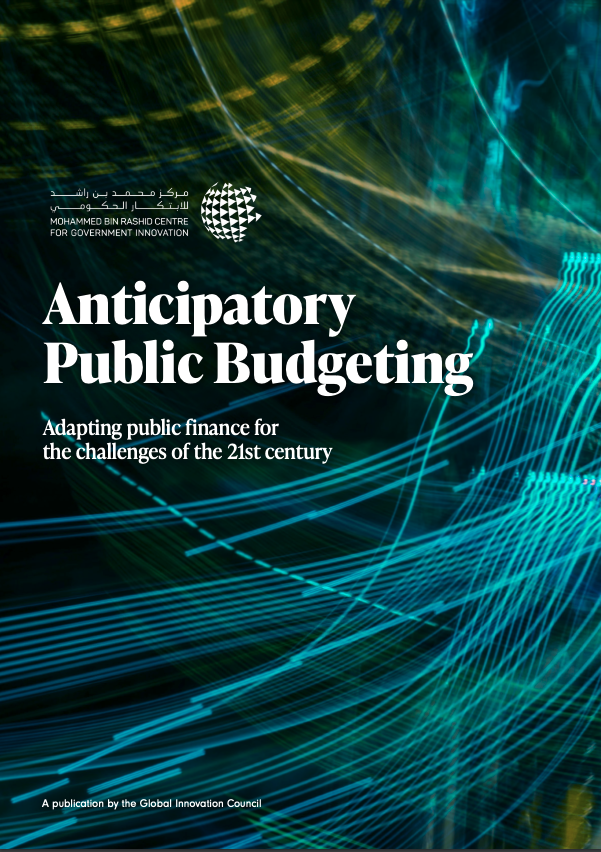21st-century governments face many complex difficult and long-term challenges: from handling demographic transitions to climate change, navigating the fourth industrial revolution to managing pensions. Public finance in the 21st century must be anticipatory—what we refer to as Anticipatory Public Budgeting—to accelerate thinking and action, on how public finance can be better adapted to long-term strategy.
Governments have to make informed decisions about how to allocate their budgets, but they do so with limited information and tight time constraints. Amidst rising complexity and uncertainty, public budgeting as we know it is proving to be inadequate. Public finance needs an overhaul to account for long-term problems, and to anticipate future risks.
How is public budgeting proving inadequate to meet long-term goals?
(1) Limited feedback. Governments have very limited feedback on the results achieved by spending, which makes it harder for them to learn.
(2) Short-termism. Governments lack good methods for mapping the long-term impacts of key areas of spending.
(3) Outdated/Inadequate metrics. Governments lack ways of mapping and measuring intangible values of all kinds, even though these are essential for economic growth and societal progress such as research and development (R&D) and human capital.
At present, only physical infrastructure investments are appraised using rigorous investment methods. Other areas of public finance, like investing in human capital and its return on investment, remain underdeveloped and are especially characterized by the above challenges.
Public finance in the 21st century
21st-century governments face many complex difficult and long-term challenges: from handling demographic transitions to climate change, navigating the fourth industrial revolution to managing pensions. A clear example of the changing needs of public finance in the 21st century was put forth by the COVID-19 pandemic, which has dramatically disrupted public spending plans in many countries across the world, with massive spending to maintain incomes, support businesses and finance health. Time horizons have shrunk back, and governments have had to prioritize coping with the crisis.
As such, public finance in the 21st century must be anticipatory. It can do so through:
- Shifting towards more comprehensive and holistic methods,
- Focusing on longer time horizons where appropriate, and
- Building more transparency and intelligence into the design of allocations and monitoring of results.
These essential transformations are what we call Anticipatory Public Budgeting (APB). APB aims to help governments align their financing decisions with their longer-term strategic objectives and to address the imbalance between their long-term goals and their usually short-term financial tools. For example, APB takes into account key elements of a national strategy that involve long time horizons, such as diversification away from oil and industrial strategy; climate change and moving to net zero; and the handling of both negative risks (such as pandemics) and positive risks (such as new technological opportunities). It also provides a scenario of what public budgeting and finance could look like in 10-20 years’ time, embedding APB methods and making use of the best available tools and technologies.
Background
The Anticipatory Public Budgeting publication informs a global audience to accelerate thinking and action, on how public finance can be better adapted to long-term strategy. It was written as a collaboration between Sir Geoff Mulgan and Demos Helsinki for the Global Innovation Council. Sir Geoff Mulgan is Professor of Collective Intelligence, Public Policy and Social Innovation at University College London and a member of the Global Innovation Council. The Global Innovation Council, funded by the Mohammed Bin Rashid Centre for Government Innovation (MBRCGI), is a platform for seeing and testing radical alternatives for how governments operate.
Interested in hearing more or getting involved? For more information on Anticipatory Public Budgeting, contact us!
Senior Expert
mikael.sokero@demoshelsinki.fi
+358 40 164 6453
Lead, Governance Innovation
mikko.annala@demoshelsinki.fi
+358 40 778 6062
Chief Executive
juha.leppanen@demoshelsinki.fi


Foresight and policymaking: lessons from Singapore and Finland
Post
September 26, 2022
From fortress to foresight: A new way of governing migration
Publication
April 6, 2023
Moving Towards a 21st Century Government: From Reimagination to Transformation
Publication
November 10, 2021
Impact of climate change on public finance
Project
November 10, 2022
Embedding a long-term view
Theme
December 3, 2024
The anticipatory policy cycle: not just preparing for the future, but influencing it
Post
May 14, 2025
South Sudan builds long-term thinking while addressing present needs
Project
May 22, 2025
Young people and the future of Scotland: a participatory Horizon Scanning engagement
Publication
June 17, 2025
Building a new economy
Theme
December 1, 2025
Doomed to grow or ready to transform?
Post
December 3, 2025